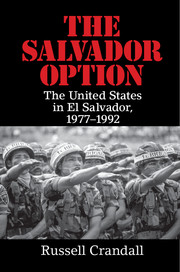Book contents
- Frontmatter
- Dedication
- Epigraph
- Contents
- List of Figures
- List of Organizations
- Acknowledgments
- 1 Introduction
- PART ONE EL SALVADOR IN THE COLD WAR
- PART TWO JIMMY CARTER
- 7 Revolution and Counterinsurgency in Guatemala
- 8 Mass Organizations
- 9 Carter Arrives
- 10 Carter and the Sandinista Revolution in Nicaragua, 1979
- 11 An October Coup
- 12 Carter Engages Salvador
- 13 Archbishop Romero
- 14 Land
- 15 The American Churchwomen
- 16 Arming the Rebels
- 17 Guerrilla Final Offensive, January 1981
- 18 Death Squads
- PART THREE RONALD REAGAN
- PART FOUR GEORGE H. W. BUSH
- PART FIVE POSTWAR
- Notes
- Bibliography
- Index
14 - Land
from PART TWO - JIMMY CARTER
Published online by Cambridge University Press: 05 June 2016
- Frontmatter
- Dedication
- Epigraph
- Contents
- List of Figures
- List of Organizations
- Acknowledgments
- 1 Introduction
- PART ONE EL SALVADOR IN THE COLD WAR
- PART TWO JIMMY CARTER
- 7 Revolution and Counterinsurgency in Guatemala
- 8 Mass Organizations
- 9 Carter Arrives
- 10 Carter and the Sandinista Revolution in Nicaragua, 1979
- 11 An October Coup
- 12 Carter Engages Salvador
- 13 Archbishop Romero
- 14 Land
- 15 The American Churchwomen
- 16 Arming the Rebels
- 17 Guerrilla Final Offensive, January 1981
- 18 Death Squads
- PART THREE RONALD REAGAN
- PART FOUR GEORGE H. W. BUSH
- PART FIVE POSTWAR
- Notes
- Bibliography
- Index
Summary
Agrarian reform was an attempt to instill in the populace a belief in the war against the guerrillas for the peasantry's hearts and minds.
– RAND Corporation reportThe most revolutionary land reform in Latin American history.
– Robert White, U.S. Ambassador, 1980Externally armed guerrillas cannot be stopped by fertilizer alone.
– John Bushnell, American diplomat“This Democratic and Anti-Oligarchic Revolution”
One night in March 1980, a “slightly built man wearing glasses and the three gold stars of a full colonel in the Salvadoran army” announced on television to the nation that more than 200 of the largest private farms would be expropriated as part of the government's effort to promote social and economic justice in this desperately poor country. In El Salvador, less than 2 percent of the population owned more than half of the arable farmland; 40 percent of the rural population owned no land at all and worked as sharecroppers on large estates or on the land of absentee owners. The next day army troops “led by officers waving the new decree” arrived at the farms to establish the new cooperatives that would be run by the peasants.
Over the next weeks, in a makeshift army command center, an officer monitored the expropriations by placing pins on a wall map indicating the designated farms. Militaries in Latin America were historically aligned with the oligarchy – and this was certainly true for much of El Salvador's history. So it was especially ironic that the military was considered the critical institution for implementing the land reform given that “power and security” were certainly needed – something impossible for a civilian agency. After the October 1979 coup, the military had benefited from the purging of around 20 percent of the entire corps – which according to the CIA had the effect of “neutralizing many corrupt senior officers and their subordinates who had long ago been co-opted by rightist civilian elites.” Now with the army backing reform, the “political and economic power of the oligarchy was quickly reduced.”
The sweeping land reform was promulgated with the “Basic Agrarian Reform Law, Decree 153” in March 1980 and had three fundamental components. Phase I (Decrees 154 and 842) included the expropriation of landholdings of all persons controlling more than 500 hectares.
- Type
- Chapter
- Information
- The Salvador OptionThe United States in El Salvador, 1977–1992, pp. 149 - 159Publisher: Cambridge University PressPrint publication year: 2016



